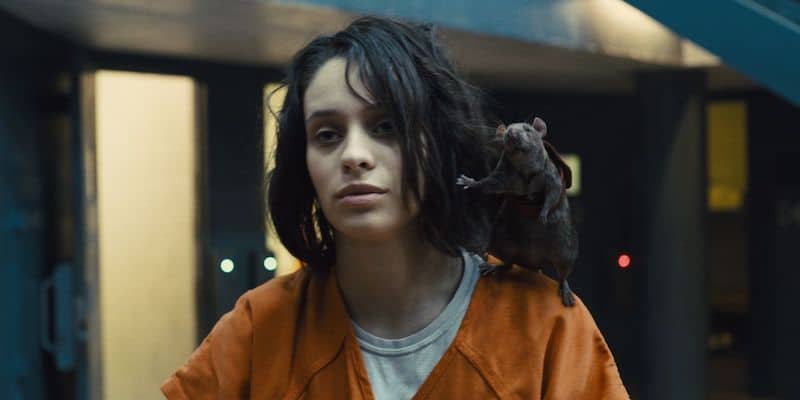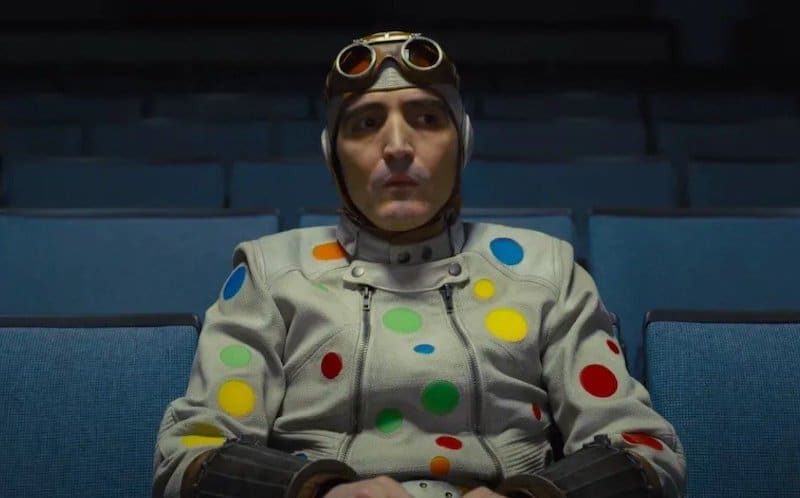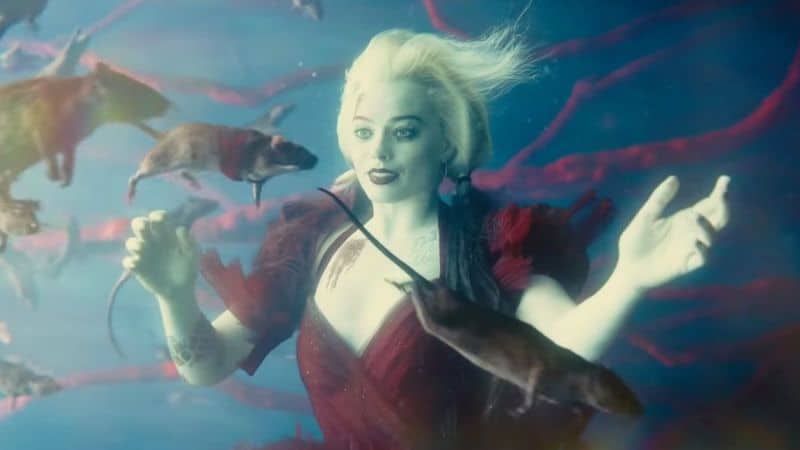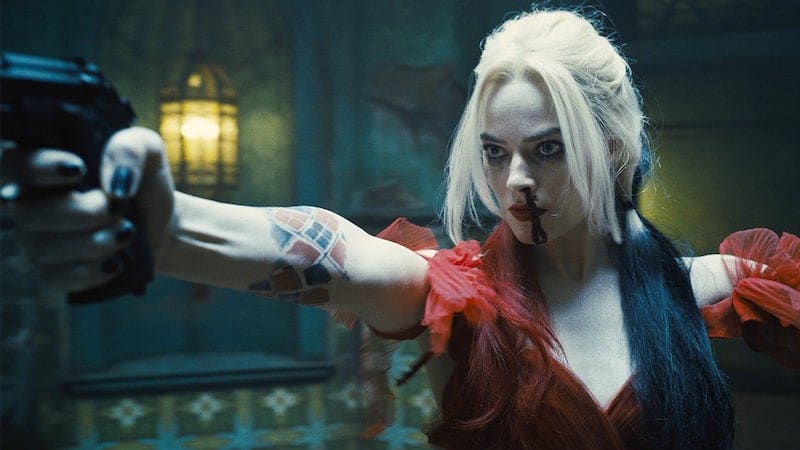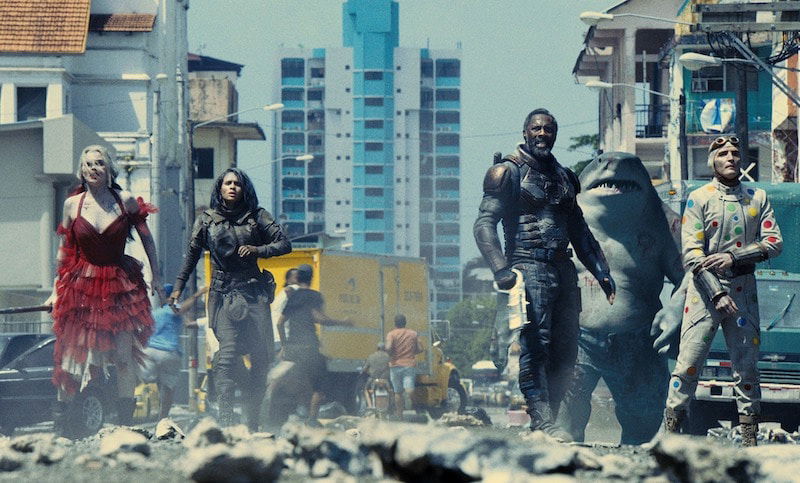In 2016, Warner Bros. released Suicide Squad, David Ayer’s take on the all-villain team from DC comics. The reviews were bad, and while it had an eye-catching style, it failed to make a positive impression on mainstream audiences overall. After director James Gunn was briefly released by Disney over some tweets, he signed on to give his own take on the terrible, terminal team, a release so highly anticipated, not even a pandemic could kill the hype. But does it live up to all of our high hopes?
…well, that’s a complicated question…

The Suicide Squad follows a team comprised of Harley Quinn, Rick Flag, Bloodsport, Peacemaker, Ratcatcher 2, King Shark and Polka-Dot Man as they head to Corto Maltese to destroy Project Jotunheim. However, when they arrive, they find Waller hasn’t given them all the information necessary, nor their true mission objectives, and they face a much bigger threat than they thought.
The plot is solidly constructed in terms of lacking the weird plotholes and inane character decisions from the previous film. The characterization is solid, the dialogue is crisp and funny, and overall, makes for a fun watch. I do think there are some narrative problems that keep it from being a great film, but I’ll go into in a bit in the spoiler section.
Overall, the cast is great. We have returning cast members Margot Robbie as Harley Quinn, Viola Davis as Amanda Waller, and Joel Kinnaman as Rick Flag. Of the three, Kinnaman gets the most time to shine, and it’s a welcome change from his plotline in Ayer’s Suicide Squad. Both Waller and Harley, however, remain pretty stagnant. Waller is still playing big boss, though now with a crew I hope we get to see more of, given the part they play in the film’s finale. And Harley, well…she’s basically the same character she’s been in all the other movies, save for one moment of introspection that is actually funny and heartbreaking. Robbie still has the manic pixie nightmare girl act down to a tee, but it’s not as strong a performance as in Birds of Prey.
Daniela Melchior as Ratcatcher 2 is the heart of this film. At every turn, she is approaching scenarios with empathy and compassion, a theme which I thought signaled she was going to be killed but thankfully not. She doesn’t get much of a narrative arc; her outlook and her powers don’t really change, but rather characters are changed by her presence. Still, she was far and away the character who is the most likable and is framed as such throughout the film.
The big stars of Idris Elba (who plays Bloodsport) and John Cena (who plays Peacemaker) are good in their roles. Their characters shine the most when they are interacting with each other, with a great scene where they are trying to outdo each other by killing people in the most outlandish ways in a seamless, continuous shot. Cena slides into the role of Peacemaker perfectly, which is unsurprising since the character is about as nuanced as your typical pro-wrestler role, and his comedic timing is strong. Elba’s beleaguered and angry Bloodsport is also a lot of fun, but works best when paired against others on the Squad rather than on his own.
Another stand-out is David Dastmalchian as Polka-Dot Man, who is so insane, it’s hard not to like him. His backstory is odd, being infected with an inter-dimensional virus due to his mother’s obsession with creating super-powered people, and now must expel polka dots twice a day or die. Still, his defeated affect and general weirdness really endeared him to me. And of course, Sylvester Stallone as King Shark was delightful, a bloodier and slightly stupider version of the Groot character.
Overall, Gunn’s signature style shines through. We’ve got a good soundtrack, well choreographed action and fight scenes, and great costuming. This is what people mean when they talk about cinematic eye-candy; every scene is balanced, bright and brimming with fun details. There’s as much comedy in the visuals as in the dialogue, with just enough gore and sexual innuendo to remind you that this isn’t just a copy-paste of his work from Marvel. It fits the Suicide Squad brand well, with quick edits, gritty overall feel, and over-the-top violence.
Now, in order to get into why this movie overall falls a little flat, we’ll have to head into major spoiler territory. If you want to avoid these, I’ll just sum it up by saying that the structure in both the plot and characters aren’t there to support the story and elevate where it could be. It’s surprising, given the balance of humor and heart that Gunn had in the Guardians of the Galaxy films.
The problem with The Suicide Squad is three-fold: delayed low stakes, lacking character arcs, poor team dynamics. Let’s break this down, component by component.
The stakes of The Suicide Squad are, ultimately, non-existent up until the third act of the film. We have no idea why Task Force X is headed to Corto Maltese until midway through act one, and why it’s important until act two. Sure, we’re given reasons why Bloodsport needs to go (which I’ll get to) but the rest of the squad? Not so much. It’s implied that Amanda Waller does this sort of thing frequently enough that everyone knows the drill, but it seems weird not to give the other characters stakes right up until the last minute, i.e. “Look, it’s the giant starfish of death that could easily take over the planet.”
I think I realized this was going to be a recurring issue when, in the first fifteen or so minutes, they killed off a huge portion of their newly “introduced” characters. And by introduced, I mean cast famous people in and made it clear none of them were going to make it by presenting no reason to care about or like them. It all felt like a wink-wink-nudge-nudge moment of meta-humor that might have worked in 2016, but not so much now.
But this problem goes even further. Once we finally meet Starro the Conquerer, we have barely any time to process the threat they pose, nor let the implications of what they do sink in further than just “Borg but with starfish”. There are no real villains in this story (unless you count Waller) and it doesn’t make sense why Starro would want to take over a city versus just getting back into space. Does every story need a villain? No. Did this one? Yes. Badly. Because without a solid villain, without a threat, there’s nothing to power the story.
Which leads to the second problem: there are little-to-no character arcs in this film. Bloodsport is the exception, given that he becomes a leader, saves his kid from going to prison, learns not to fear rats, and wins his dick-measuring contest with Peacemaker. However, because we didn’t get enough time to know Bloodsport in the beginning of the film, that growth doesn’t get the weight it should. The interaction with his daughter is tense but there seems to be no real affection there, It also doesn’t help that the “perfect-aim man is doing this for his daughter” plot line was used in the first Suicide Squad.
Peacemaker does show some growth, but not enough to pull him out of his flat characterization and eventual heel turn (which, was anyone surprised by that?). Ratcatcher 2 doesn’t evolve with the story, nor does Harley, who remains as manic and chaotic in the beginning as the end. Polka-Dot Man does get his moment of growth…before being killed so, we’re not counting that one either. King Shark, at the very least, learns about friendship, so points there.
Finally poor team dynamics. What do I mean by this? Well, it feels like the film is split up into two sections: the Harley Quinn section and then the everyone else section. In most team movies, side plots tend to involve at least two of the characters in the ensemble, so we can see how they interact and develop a relationship. By pulling Harley away, and not giving her a character arc where she changes in any way, it feels like you’re watching a series of shorts that were meant to be a companion to the film, not part of the whole movie. We get to see the other members of the new Suicide Squad grow to like each other, learn about each other’s pasts, develop a rapport. Then Harley comes in for the big finale, and try as the dialogue might, she doesn’t gel with the rest of the group.
Case in point, her shouting match with Polka-Dot Man feels forced — of course she doesn’t know who Milton the driver is, she only knew him for like five minutes before they lay siege to Jotunheim! But the dialogue wants to make you think she should, that it should be funny that Milton has been there the whole time and Harley never noticed. Then, when the big battle starts, Harley immediately goes off on her own to javelin Starro in the eye while the others work together to try and slow it down. Keeping her separated for so long really makes the movie feel bisected and removes any sense of narrative cohesion.
If anything, this movie feels like one of those special-issue comics, where you have a bunch of characters meet, fight a villain of no consequence, and no development happens because that would mess up the continuity of their other series. Does that mean The Suicide Squad is a bad movie? No, but it’s not a substantive or satisfying one either. It’s a film that doesn’t have anything to say, but it sure does look good doing it.
Summary
If there’s one word to describe The Suicide Squad, it would be “fun”. Excellent action set pieces, cool locations and costumes, and generally good rapport from a strong cast. However, the narrative structure leaves a lot to be desired and keeps it from being great.


